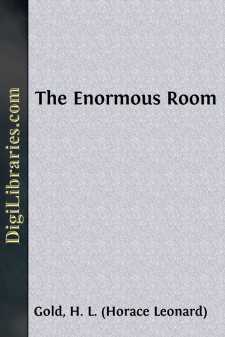Categories
- Antiques & Collectibles 13
- Architecture 36
- Art 48
- Bibles 22
- Biography & Autobiography 813
- Body, Mind & Spirit 142
- Business & Economics 28
- Children's Books 15
- Children's Fiction 12
- Computers 4
- Cooking 94
- Crafts & Hobbies 4
- Drama 346
- Education 46
- Family & Relationships 57
- Fiction 11828
- Games 19
- Gardening 17
- Health & Fitness 34
- History 1377
- House & Home 1
- Humor 147
- Juvenile Fiction 1873
- Juvenile Nonfiction 202
- Language Arts & Disciplines 88
- Law 16
- Literary Collections 686
- Literary Criticism 179
- Mathematics 13
- Medical 41
- Music 40
- Nature 179
- Non-Classifiable 1768
- Performing Arts 7
- Periodicals 1453
- Philosophy 64
- Photography 2
- Poetry 896
- Political Science 203
- Psychology 42
- Reference 154
- Religion 513
- Science 126
- Self-Help 84
- Social Science 81
- Sports & Recreation 34
- Study Aids 3
- Technology & Engineering 59
- Transportation 23
- Travel 463
- True Crime 29
H. L. (Horace Leonard) Gold
Horace Leonard Gold (1914–1996) was an influential American science fiction writer and editor, best known for editing the magazine "Galaxy Science Fiction" from 1950 to 1961. His editorial work helped shape the genre by encouraging more sophisticated, socially conscious storytelling. Gold also wrote several novels and short stories, including "What Will They Think of Last?" and "The Old Die Rich." Despite struggling with agoraphobia and post-traumatic stress disorder after World War II, Gold left a lasting impact on science fiction with his innovative ideas and editorial direction.
Author's Books:
Sort by:
If there was one thing Dr. Kalmar hated, and there were many, it was having a new assistant fresh from a medical school on Earth. They always wanted to change things. They never realized that a planet develops its own techniques to meet its own requirements, which are seldom similar to those of any other world. Dr. Kalmar never got along with his assistants and he didn't expect to get along with...
more...
The roller coaster's string of cars, looking shopworn in their flaky blue and orange paint, crept toward the top of the incline, the ratcheted lift chain clanking with weary patience. In the front seat, a young couple held hands and prepared to scream. Two cars back, a heavy, round-shouldered, black-mustached man with a swarthy skin clenched his hands on the rail before him. A thin blond fellow...
more...
When Clocker Locke came into the Blue Ribbon, on 49th Street west of Broadway, he saw that nobody had told Doc Hawkins about his misfortune. Doc, a pub-crawling, non-practicing general practitioner who wrote a daily medical column for a local tabloid, was celebrating his release from the alcoholic ward, but his guests at the rear table of the restaurant weren't in any mood for celebration....
more...




